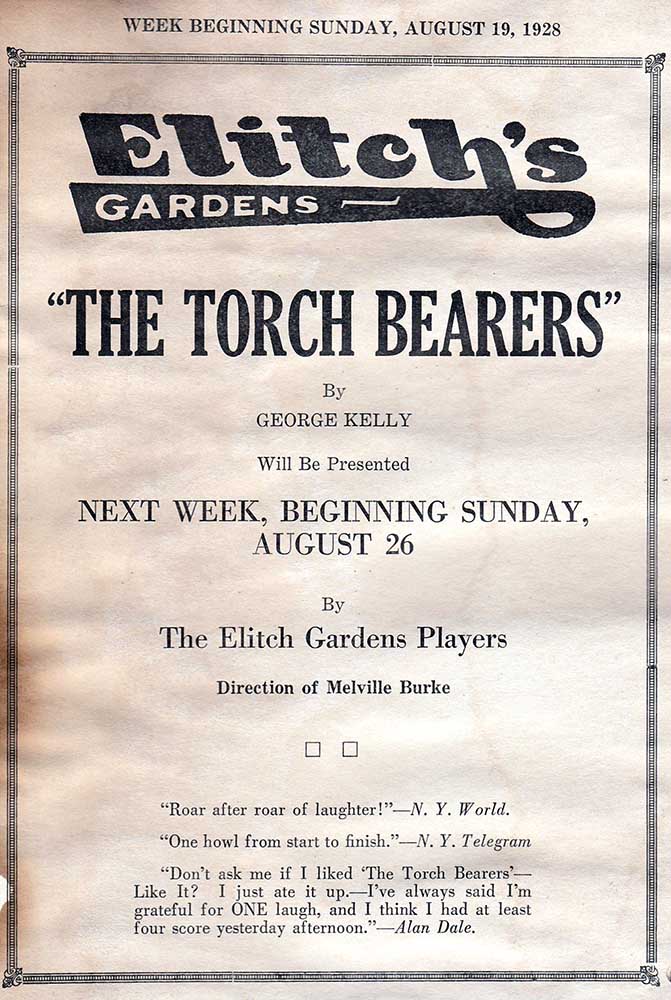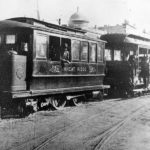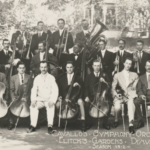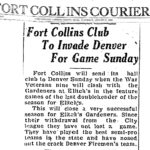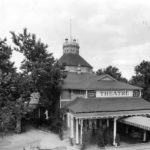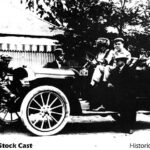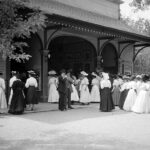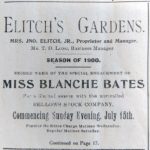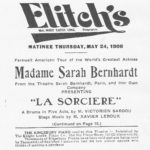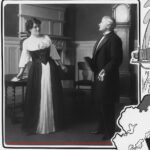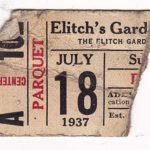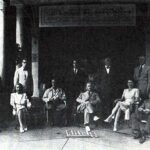Among the twelve plays of the season were Fritz Gottwald’s The Command to Love, which sparked some controversy among the theatergoers, and Arthur Wing Pinero’s The Second Mrs. Tanqueray, which was first performed on May 27, 1893 at the St. James Theater in London.
The leads for the season were Isabel Elsom and Fredric March. It was the third consecutive season in which Fredric March was the leading actor. His popularity with the audience continued. Sylvia Sidney was the ingenue of the season. The cast celebrated her 18th birthday on August 18th with a big party. After the season of stock, she went on to stage and screen stardom. In 1931, she starred in Dead End, the film in which the Dead End Kids first appeared. She returned to Elitch Theatre decades later and celebrated her 66th birthday while starring in Sabrian Fair.
The Command to Love was promoted as a “hot” show that “is going to be one of the most talked-about things ever presented in the Elitch Gardens Theatre.” Fredric March played the role of Gaston, a young military attaché of the French ambassador stationed in Madrid. Isobel Elsom was cast as Manuela, wife of the Spanish war minister.
Gaston … is called upon to engineer an affair of the boudoir with Manuela, wife of the Spanish war minister, in order that she will influence her husband to vote for a certain treaty highly desired by France. But, being already engaged in a love affair with the wife of his superior, the French ambassador, Gaston finds it difficult to turn his attentions to Manuela – particularly since his ambassador’s wife possesses certain incriminating letters from Gaston.
How (Gaston) finally is persuaded to renounce his vow to Mrs. Ambassador; how he arranges matters with Manuela and her war minister husband; how Gaston’s incriminating letters come into the hands of his superior officer, only to be regained by Gaston just as he is about to be disgraced – these are things that make The Command to Love the unusual bit of stagecraft it is.
The spicy dialogue of the play “wavers between sparkling wit and clever acting throughout the three scenes.” In the second act, there is a love scene between Gaston and the wife of the war minister, interrupted half a dozen times, which was described as “the laughing high spot of the whole play.”
The play sparked comments to the drama editor. The following letter by a theater patron, critical of the play, was published in the Denver Post.
I have just returned from seeing The Command to Love at the Elitch Gardens Theatre, and I am so boiling mad at having had to sit through such a suggestive play that I cannot refrain from asking you to warn others who may contemplate going to Elitch during the rest of the week. Really, I never have seen anything quite so “raw” in all my days of theatergoing, and it was embarrassing for me to remain in the Theatre throughout the show.
I used the word “suggestive” in my first paragraph of this letter, but that word actually doesn’t apply to The Command to Love. The play is NOT merely suggestive – it leaves absolutely nothing to the imagination.
The idea of asking the public to watch a play in which the leading man is having a sordid affair with a married woman! It’s positively shocking and disgraceful. And the dialogue! Why, people would be arrested sent to jail if they talked that way on the streets!
The Command to Love, in my estimation, is a show that nobody would want to see and hear, and if half the audiences do not get up and walk out during every performance of it, then I have the wrong impression of Denver theater patrons.
However, another letter from a theater patron applauded the play.
I saw the show Sunday night and I do not hesitate to say publicly that it absolutely is the smartest, cleverest, most interesting play I ever have seen in Denver at any theater.
The lines and situations are the cleverest I have heard and seen, and while some of them are risque, they are so brilliant and pointed that they cannot give offense, and the way the players carry their parts is a real delight.
I, for one, hope Mr. Mulvihill will give us many more plays as sparkling and scintillating as The Command to Love, and I am sure if he does his theater will be filled to capacity at every performance.
[Borrillo, T. A. (2012). Denver’s historic Elitch Theatre: A nostalgic journey (a history of its times). Colorado. p. 149-150]
Theatre Staff:
- John M. Mulvihill, President
- George L. Roberts, Treasurer
- Arnold B. Gurtler, Secretary
- Melville Burke, Director
- Frank McDonald, Assistant Director
- Horace Armistead, Art Director
Resident Company:
- Isobel Elsom
- Sylvia Sidney
- Jessamine Newcombe
- Frances Goodrich
- Edna James
- Frederic March
- Vernon Steele
- Albert Hackett
- Jay Fassett
- Doan Borup
- Francis Compton
- C. Henry Gordon.
Productions:
- Week of June 9: Baby Cyclone, by George M. Cohan
- Week of June 17: The Springboard, by Alice Duer Miller
- Week of June 24: The Outsider, by Dorothy Brandon. Miss Elsom played the role she created in London.
- Week of July 1: Tommy, by Howard Lindsay and Bertrand Robinson
- Week of July 8: Behold the Bridegroom, by George Kelly
- Week of July 15: Nightstick, by John Wray, J. C. and Elliott Nugent and Elaine Carrington
- Week of July 22: The Second Mrs. Tanqueray, by Arthur Wing Pinero
- Week of July 29: Saturday’s Children, by Maxwell Anderson
- Week of Aug. 5: The K Guy, by Walter Deleon and Alethea Luce (try-out of a new play, presented in New York Oct. 15, 1928).
- Week of Aug. 12: The Command to Love, by Rudolph Lothar and Fritz Gottwald, adapted by Herman Bernstein
- Week of Aug. 19: The Mulberry Bush, by Edward Knoblock. Vernon Steele replaced Frederic March as leading man.
- Week of Aug. 26: The Torchbearers, by George Kelly
